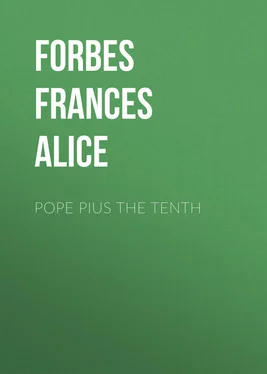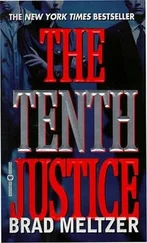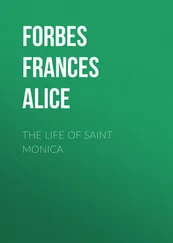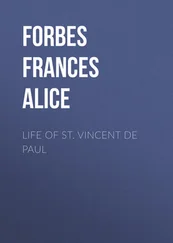Frances Forbes - Pope Pius the Tenth
Здесь есть возможность читать онлайн «Frances Forbes - Pope Pius the Tenth» — ознакомительный отрывок электронной книги совершенно бесплатно, а после прочтения отрывка купить полную версию. В некоторых случаях можно слушать аудио, скачать через торрент в формате fb2 и присутствует краткое содержание. Жанр: foreign_antique, foreign_prose, на английском языке. Описание произведения, (предисловие) а так же отзывы посетителей доступны на портале библиотеки ЛибКат.
- Название:Pope Pius the Tenth
- Автор:
- Жанр:
- Год:неизвестен
- ISBN:нет данных
- Рейтинг книги:5 / 5. Голосов: 1
-
Избранное:Добавить в избранное
- Отзывы:
-
Ваша оценка:
- 100
- 1
- 2
- 3
- 4
- 5
Pope Pius the Tenth: краткое содержание, описание и аннотация
Предлагаем к чтению аннотацию, описание, краткое содержание или предисловие (зависит от того, что написал сам автор книги «Pope Pius the Tenth»). Если вы не нашли необходимую информацию о книге — напишите в комментариях, мы постараемся отыскать её.
Pope Pius the Tenth — читать онлайн ознакомительный отрывок
Ниже представлен текст книги, разбитый по страницам. Система сохранения места последней прочитанной страницы, позволяет с удобством читать онлайн бесплатно книгу «Pope Pius the Tenth», без необходимости каждый раз заново искать на чём Вы остановились. Поставьте закладку, и сможете в любой момент перейти на страницу, на которой закончили чтение.
Интервал:
Закладка:
If the medieval charm of Castelfranco had influenced the young student so profoundly, there was enough and to spare in the city of Padua to satisfy his love of beauty. Famous throughout the world is the basilica of Il Santo, built in the thirteenth century, and dedicated in honour of the great St. Antony. Sculptures by Donatello, bas-reliefs by Lombardi and pictures by Mantegna, Veronese and Giotto adorn its walls. The cathedral, partly destroyed in the twelfth century, was rebuilt by Michelangelo. The university, founded in the thirteenth century, and counting among its students such men as Vittorino da Feltre, the great educator, and Giovanni da Ravenna, the friend of Petrarch, was famous throughout the Middle Ages for its schools of medicine and of law.
The seminary, founded in 1577 and greatly enlarged a century later, boasts a handsome church and a noble library rich in precious manuscripts. It was probably the first library that Bepi had seen, certainly the first of which he had had the freedom, and one can imagine the delight of the young student as he wandered through its lofty halls, and realized that its treasures were henceforward part of the endowment of the new life that was now his.
The intelligence and cheery good-humour of Giuseppe, joined to the charm of manner that seems to have been his from childhood, soon made him a general favourite both with boys and masters. "His mind is quick," wrote one of the latter to Don Pietro Jacuzzi, who had succeeded Don Orazio as curate of Riese and was a firm friend of Bepi's, "his will strong and mature, his industry remarkable." The somewhat strict discipline of the seminary presented no difficulties to a boy who had all his life been accustomed to self-denial; a willing and intelligent submission to authority was indeed a characteristic of Giuseppe Sarto throughout his life. "In order to command," he was to say hereafter as pope, "it is necessary to have learned to obey."
At the end of his first year at Padua, Giuseppe was first in all his classes. The home-coming to Riese was an unclouded joy, both to the young seminarist and to his family. The holidays were spent in the company of the friends of his childhood in the country that he loved. To Don Jacuzzi and Don Fusarini he was as a beloved son, and much of his time was spent either at the presbytery or in long rambles with the good curate. Neither could studies be altogether neglected, although it was holiday time; and the autumn days passed quickly enough.
Back again at Padua, Giuseppe set to work vigorously, without a presentiment of the sorrow that was so soon to overcloud his happiness. In the month of May his father died after a few days' illness, leaving his wife and large family in very straitened circumstances. The thought of the struggle which his mother was waging against poverty lay like a weight upon Giuseppe's heart. He was the eldest of the family and would have come to her assistance, but not for worlds would the good Margherita have allowed her son to give up his priestly career. She was full of courage, and the other boys were growing up; they would soon be able to help to support the family. A second grief followed upon the first. Don Tito Fusarini, who had been like a second father to Bepi, and whose failing health had caused him for some time past to rely more and more upon the devotedness of his curate, was at last obliged to give up his work at Riese.
Don Pietro Jacuzzi, who succeeded him as rector, had been, from the day of his arrival in the village, Giuseppe's firm friend and chief adviser in all his boyish difficulties. The lad looked up to him as the model of everything that a priest should be, and corresponded with him continually from Padua. To him he owed the love and the knowledge of music that was to prove so valuable in after years, for had he not assisted at the transformation that had taken place in the village choir under the able tuition of Don Pietro? He had been witness, too, of the rector's unselfish and untiring devotion to his priestly duties which had won him the love and reverence of his parishioners; but within a year Giuseppe was to lose this second friend also. Don Pietro was transferred to Vascon, to the grief of the people of Riese.
When Giuseppe came home for the autumn holidays in 1853 the fullness of his loss became clear to him; Riese was hardly Riese without Don Tito and Don Pietro. The new parish priest, whose somewhat morose character formed a striking contrast to the genial kindliness of his two predecessors, was not popular. He did not like sick calls in the night, and told his parishioners so plainly from the pulpit. But sickness and death have a knack of not considering the convenience of the parish priest, or indeed of anybody else; and of this the inhabitants of Riese were fully aware.
By his very position as a church student Giuseppe was bound to be on friendly terms with the presbytery. On the other hand, mixing as he did with the people of the place, he could not avoid hearing some severe criticisms of their pastor. While forced to admit to himself that the methods of the new arrival were a little singular, the boy's loyal and upright nature forbade him to discuss matters with his friends. In this difficult and awkward position the lad of seventeen showed a tact and discernment which would have been admirable in a man of experience, "These holidays have been perfectly miserable," he wrote to Don Jacuzzi, who had learnt from other correspondents how things were going on; "I shut myself up in the house as much as I can and try when visiting the members of my family to keep off dangerous subjects."
"No greater grief than to remember days
Of joy when sorrow is at hand,"
he quotes, for he knew his Dante well. "Even the singing has gone down. I long for my little room at the seminary and the quiet life of study."
In 1856 Giuseppe distinguished himself more than ever, He had now only two years more to spend at the seminary. His brilliant successes as a student left him modest and humble as before, whilst his cheery kindliness and sympathy made him a powerful influence for good amongst his young companions. Such was the trust reposed in him by his superiors that he had for long been prefect of discipline in the general study room. "My masters call me ' Giubilato '," he wrote to Don Pietro. "I wish I could do more to show my gratitude for their kindness." Nevertheless he greatly appreciated the private room allotted to him during his last two years at Padua. "Here I read and work," he wrote to the same dear friend, "and prepare myself for the life of solitude and study that will be mine as a priest." His favourite studies were the Bible and the Fathers of the Church. The pastoral letters and papal encyclicals of later years bear witness to the fact that this predilection lasted throughout his life.
His knowledge and love of music had obtained for him the direction of the seminary choir. "I have worked so hard at the music for the feast of St. Aloysius," he wrote in the June of 1857, "that I am fairly dried up."
On the 27th of February of the same year he was ordained subdeacon in the cathedral of Treviso, and on the feast of the Sacred Heart went to Riese to preach. "Last Sunday I went to Riese to give a little discourse on the Sacred Heart," he writes to Don Pietro. He does not mention that the little discourse was so striking and so eloquent that the enthusiasm of the congregation knew no bounds.
At the end of August, 1858, Giuseppe Sarto's seminary life was over. As he was only twenty-three, and the canonical age for ordination is twenty-four, the Bishop of Treviso wrote to Rome to obtain a dispensation. The young cleric had finished his last year as he had finished his first, with honours in every subject. The record of his triumphal progress is still to be seen in the books of the seminary of Padua, the professors united in praising the qualities of his character no less than those of his intellect. In September the dispensation arrived, and with it the day so long desired, when Giuseppe Sarto was to be for ever consecrated to the service of God. The Bishop of Treviso was then at Castelfranco, and it was here that the ordination was to take place.
Читать дальшеИнтервал:
Закладка:
Похожие книги на «Pope Pius the Tenth»
Представляем Вашему вниманию похожие книги на «Pope Pius the Tenth» списком для выбора. Мы отобрали схожую по названию и смыслу литературу в надежде предоставить читателям больше вариантов отыскать новые, интересные, ещё непрочитанные произведения.
Обсуждение, отзывы о книге «Pope Pius the Tenth» и просто собственные мнения читателей. Оставьте ваши комментарии, напишите, что Вы думаете о произведении, его смысле или главных героях. Укажите что конкретно понравилось, а что нет, и почему Вы так считаете.












